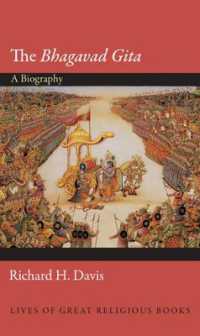基本説明
Here, expert scholars come together to unravel the complex processes involved in the definition, production and consumption of heritage and its material culture in the Middle East.
Full Description
During the nineteenth century, cultural heritage became a dominant feature of the political ideology of the European states and of their colonies. It became a new form of legitimization for the rising nation-state, cementing its inextricable link with that nation's politics and practices. The set of concepts and practices defining cultural heritage were exported to, and imposed over, the colonized populations in North Africa and the Near East. The legacy of the colonial period has proven very significant in the domain of cultural heritage which has become a crucial cultural arena in many Arab states. As in the majorities of post-colonial states, in the Arab world, the inherited paradigm of cultural heritage has been subject to various forms of adaption and re-elaboration that have made it a lively and complex space of negotiations between various actors. Thus, in The Politics of Cultural Heritage in the Middle East, Irene Maffi and Rami Daher draw together expert scholars to unravel these complex processes that are involved in the definition, production and consumption of heritage and its material culture in the Middle East, and the dynamics of the key actors involved.
The variety of the cases analysed that cover the region from Morocco to Lebanon, as well as the multiplicity of the actors concerned such as the state (post-colonial or colonial), international organizations, municipal councils, local communities, families and even exceptional personalities, highlights and explores the complex processes where very local and specific dynamics intertwine with transnational economic, political and cultural fluxes. In its examination of the workings of cultural heritage in the Middle East, this book is an important resource for students and scholars of Middle East Studies, Cultural History, History of Art and Architecture, and for stakeholders involved in the field of cultural heritage.
Contents
Introduction
I. Historical Premises
Chapter 1: Heritage as Cultural Capital in the Late Ottoman Empire
Chapter 2: The Basilica Affair: Patrimonialization as a Colonial Practice
Chapter 3: From Medieval Cairo to Belle Epoque Egypt: Outsiders, Dissonances and the Manufacturing of Heritage
II. Arab Landscapes of Heritage
Chapter 4: Heritage as a Battleground: Development, Gentrification and the Politics of Preservation in the Contemporary Middle East
Chapter 5: Arab Cultural Heritage and the Arab League: Constructing Identity through History
Chapter 6: Exhibiting and Preserving Modern Art: Museums and Exhibition Spaces in the Arab World
Chapter 7: Urban Heritage Reconsidered: Visioning the Contemporary City
III. Local Actors and International Fluxes in the Heritage Domain
Chapter 8: Notable Families and Urban Heritage Activists as Emergent Local Actors
Chapter 9: The Domestic Heritage: Public or Private?
Chapter 10: 'Al-Medina al-Qadima' of Damascus: Preservation of the Cultural Heritage
Chapter 11: In Search for Identity: Jewish Heritage and the Idea of 'Maroc Pluriel'
Chapter 12: History and Heritage Studies: Passing Interest or Epistemological Turn?
Conclusion: The Destiny of a Western Paradigm in the Arab World







